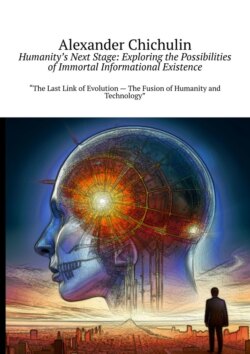Humanity’s Next Stage: Exploring the Possibilities of Immortal Informational Existence

Реклама. ООО «ЛитРес», ИНН: 7719571260.
Оглавление
Группа авторов. Humanity’s Next Stage: Exploring the Possibilities of Immortal Informational Existence
Chapter 1: Introduction
Explanation of the concept of evolution
Brief history of human evolution
The current state of humanity
Chapter 2: The Technological Revolution
Overview of technological advancements throughout history
The impact of technology on human evolution
The future of technology and its potential effects on humanity
Chapter 3: The Cybernetic Stage
Explanation of cybernetic technology
The potential benefits and drawbacks of merging with technology
The impact of the cybernetic stage on human evolution
Chapter 4: The Immortal Informational Existence
The concept of an immortal informational existence
The benefits and drawbacks of becoming a stream of information
The impact of this evolution on humanity as a whole
Chapter 5: The Bright Future Ahead
An optimistic outlook on the future of humanity
Potential advancements in science and technology that could lead to an immortal informational existence
The potential benefits of this evolution for humanity
Chapter 6: Conclusion
Summary of key points
Final thoughts on the future of humanity
Отрывок из книги
Evolution is the process by which living organisms change over time through adaptations that help them survive and reproduce. This process is driven by natural selection, which is the idea that individuals with certain traits that are better suited to their environment are more likely to survive and pass those traits on to their offspring. Over time, these advantageous traits become more common in a population, while less advantageous traits become less common.
The concept of evolution applies to all living organisms, including humans. The evolutionary history of humans extends back millions of years to the emergence of the first primates. Through a series of adaptations, humans evolved to become bipedal, to develop larger brains, and to acquire unique traits such as language and culture.
.....
– 1.8 million years ago: Homo erectus appears, with a more modern body shape and the ability to control fire.
– 300,000 years ago: Homo sapiens, the modern human species, emerges in Africa with a larger brain and more sophisticated culture and language abilities.
.....